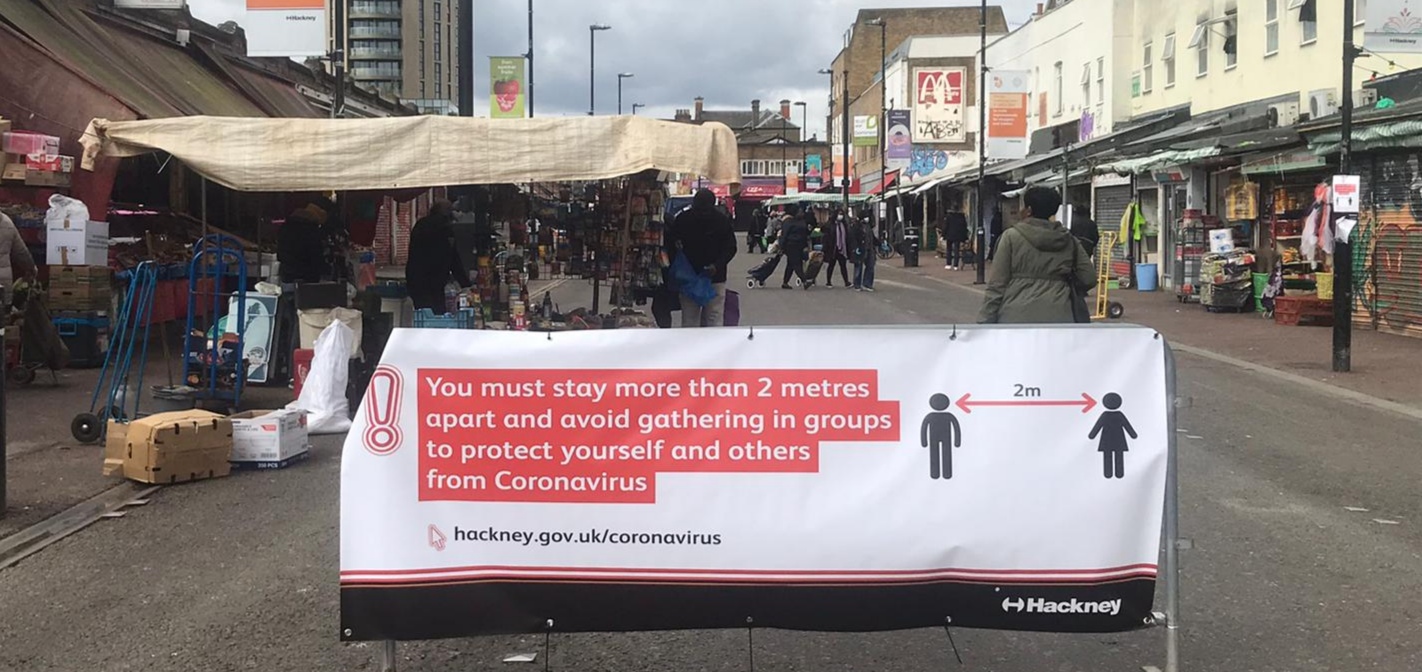 @RidleyUpdates
@RidleyUpdates

Why food markets need to stay open to help us through this crisis.
As the country faces both a health and economic crisis, we need to support small food businesses providing healthy food that reach places others can’t, writes Sustain’s Deputy Chief Executive, Ben Reynolds.
It started, as many things seem to in this lockdown, with a couple of emails. I received the story of a market that was closing in Southwark. Then came another email about markets closing in Hackney. Then Liverpool, Gloucester, Oxford, Islington, Stockport, Cardiff. Up and down the country the story was the same. Whilst low turnout may in the weeks to come force many to shut, or traders decide it’s not worthwhile to turn up, these closures were mainly because of landowners not allowing markets to continue trading on the grounds of potential risks related to people gathering.
This is an understandable reaction in the current crisis, and the landowners, many of which are local authorities, are right to adhere to and promote government social distancing guidance, and to restrict people gathering. But such closures also go against a more fundamental principle that people need to eat, and perhaps demonstrates a lack of consideration of the knock-on effects on people’s ability to find food. For many people who are unable to get to out of town megamarkets or afford fresh – or any - food from other outlets, the closure of local food markets will now exacerbate their poverty and hunger.
For the Alexander Rose Charity, which runs the Rose Vouchers for Fruit & Veg Project to help increase the consumption of healthy food amongst families on low incomes, the role of local food markets is critical. The organisation works closely with markets in three cities to support traders accepting the vouchers, something that has proved difficult for the Government’s own Healthy Start vouchers, which are predominantly only redeemed at large supermarket chains. Jonathan Pauling, who runs the charity, points out that markets usually provide much more affordable fruit and vegetables than most other outlets, and are more culturally appropriate to the people in their communities. “Traditional street markets help people from low income communities to avoid food poverty and access healthy food every week. For many, this is a lifeline without which they wouldn’t be able to afford to feed their families, and certainly not to feed them healthily. Shutting markets at a time when access to affordable healthy food is more important than ever will only increase the insecurity of many who, given the option, would rather shop at markets than rely on Government handouts.”
The guidance from the Government is clear – food markets can stay open [1]. But the message that needs to be made more clearly is that they should stay open, if run safely. In many of the cases where the decision has been made to shut them, it seems down to a perceived risk, rather than a proven one, and to a lack of desire or inability to prioritise support to keep these markets open. Does a responsibly run outdoor market visited by a few hundred people across a day really present a greater potential risk to public health than a supermarket visited by many thousands?
No-one would currently want to see the kind of crowds that were part of the panic buying hitting all food shops a few weeks ago. It is clear, however, that without support for these markets, vital outlets will be lost for food that then may not find a home and be left to rot; food waste feeding nobody while people go hungry.
But there is hope for markets. Their supporters up and down the country are mobilising to demonstrate and share good practice, finding their voice to talk to landowners, councillors, police forces, and Government policy makers, to give them the confidence that markets can be run safely and play a vital role in helping to feed the nation. Another ray of light is that some markets are now opening their doors or gates again, some operating with fewer traders providing only essential goods, with extra stewards supporting social distancing, and other rapid innovations to market-life. East Street Market in Southwark, where traders accept Rose Vouchers, will be reopening next week with enhanced social distancing measure in place to protect people and traders. Other London boroughs that temporarily halted some markets are looking to follow suit
Many market operators and traders are finding new ways to trade, often delivering food to people’s doors, which has never been needed more. Traders at Stockport Market have launched a delivery and collection service after the closure of the market to the public. Cardiff Farmers’ Markets have been cancelled but many traders are offering delivery. These are not large national or multinational businesses with huge capacity or digital expertise, so implementing such innovations so quickly is nothing short of a miracle.
Supporting these small businesses is vital for maintaining diversity and resilience in our food system. Supermarkets will weather, and even greatly profit from, this storm. Small businesses are more likely to fail, never to return. Some people may question why this matters when so many other sectors of the economy are facing ruin, but this shouldn’t be a reason not to find active ways to keep them in business, but rather to consider government payouts as a last resort. I don’t know one business that wouldn’t rather be trading than having to shut up shop.
This question of diversity is key to the resilience of our food chains. Larger businesses have stepped up well to this particular crisis, but not without showing the strains of the current highly concentrated system. It is in no ways prudent to be putting all our eggs in one basket – an old but apt saying in these circumstances. We could so easily be in a similar scale of crisis of a different nature that if it were to affect the centralised logistics hubs and supply chains of the supermarkets would leave our country scrabbling to find food, where once we relied on many more suppliers in a more complex, and arguably healthy, web. The short term gains from this system that have been made on prices may come back to haunt us sooner rather than later. The best remedy right now is to help keep smaller food businesses afloat and markets, if run safely, are a vital part of this medicine.
For links to current guidance on safe running of markets, as well as how to support other supply chains, see Sustain’s Coronavirus pages
[1] On 23 March 2020, the Government clarified that food markets can stay open during the crisis throughout the UK. See here, (section 2, first bullet point).
Update: Ridley Road market, pictured above, has worked with all its fresh produce traders to accept Rose Vouchers. With over 3000 used in the last few weeks, the Hackney markets team are assisting the traders to get the vouchers processed as quickly as possible.
Coronavirus Food Alert: Sustain's work on food resilience in the COVID-19 coronavirus pandemic.We are helping secure food for vulnerable people and supporting local emergency responses.
Sustain
The Green House
244-254 Cambridge Heath Road
London E2 9DA
020 3559 6777
sustain@sustainweb.org
Sustain advocates food and agriculture policies and practices that enhance the health and welfare of people and animals, improve the working and living environment, promote equity and enrich society and culture.
© Sustain 2026
Registered charity (no. 1018643)
Data privacy & cookies
Icons by Icons8







